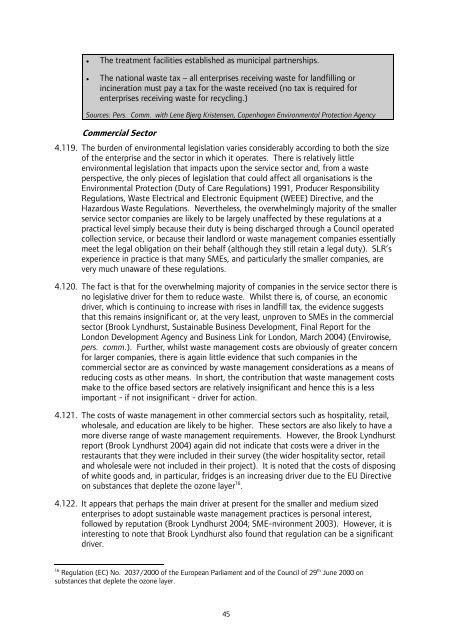London Wider Waste Strategy - London - Greater London Authority
London Wider Waste Strategy - London - Greater London Authority
London Wider Waste Strategy - London - Greater London Authority
Create successful ePaper yourself
Turn your PDF publications into a flip-book with our unique Google optimized e-Paper software.
• The treatment facilities established as municipal partnerships.<br />
• The national waste tax – all enterprises receiving waste for landfilling or<br />
incineration must pay a tax for the waste received (no tax is required for<br />
enterprises receiving waste for recycling.)<br />
Sources: Pers. Comm. with Lene Bjerg Kristensen, Copenhagen Environmental Protection Agency<br />
Commercial Sector<br />
4.119. The burden of environmental legislation varies considerably according to both the size<br />
of the enterprise and the sector in which it operates. There is relatively little<br />
environmental legislation that impacts upon the service sector and, from a waste<br />
perspective, the only pieces of legislation that could affect all organisations is the<br />
Environmental Protection (Duty of Care Regulations) 1991, Producer Responsibility<br />
Regulations, <strong>Waste</strong> Electrical and Electronic Equipment (WEEE) Directive, and the<br />
Hazardous <strong>Waste</strong> Regulations. Nevertheless, the overwhelmingly majority of the smaller<br />
service sector companies are likely to be largely unaffected by these regulations at a<br />
practical level simply because their duty is being discharged through a Council operated<br />
collection service, or because their landlord or waste management companies essentially<br />
meet the legal obligation on their behalf (although they still retain a legal duty). SLR’s<br />
experience in practice is that many SMEs, and particularly the smaller companies, are<br />
very much unaware of these regulations.<br />
4.120. The fact is that for the overwhelming majority of companies in the service sector there is<br />
no legislative driver for them to reduce waste. Whilst there is, of course, an economic<br />
driver, which is continuing to increase with rises in landfill tax, the evidence suggests<br />
that this remains insignificant or, at the very least, unproven to SMEs in the commercial<br />
sector (Brook Lyndhurst, Sustainable Business Development, Final Report for the<br />
<strong>London</strong> Development Agency and Business Link for <strong>London</strong>, March 2004) (Envirowise,<br />
pers. comm.). Further, whilst waste management costs are obviously of greater concern<br />
for larger companies, there is again little evidence that such companies in the<br />
commercial sector are as convinced by waste management considerations as a means of<br />
reducing costs as other means. In short, the contribution that waste management costs<br />
make to the office based sectors are relatively insignificant and hence this is a less<br />
important - if not insignificant - driver for action.<br />
4.121. The costs of waste management in other commercial sectors such as hospitality, retail,<br />
wholesale, and education are likely to be higher. These sectors are also likely to have a<br />
more diverse range of waste management requirements. However, the Brook Lyndhurst<br />
report (Brook Lyndhurst 2004) again did not indicate that costs were a driver in the<br />
restaurants that they were included in their survey (the wider hospitality sector, retail<br />
and wholesale were not included in their project). It is noted that the costs of disposing<br />
of white goods and, in particular, fridges is an increasing driver due to the EU Directive<br />
on substances that deplete the ozone layer 16 .<br />
4.122. It appears that perhaps the main driver at present for the smaller and medium sized<br />
enterprises to adopt sustainable waste management practices is personal interest,<br />
followed by reputation (Brook Lyndhurst 2004; SME-nvironment 2003). However, it is<br />
interesting to note that Brook Lyndhurst also found that regulation can be a significant<br />
driver.<br />
16 Regulation (EC) No. 2037/2000 of the European Parliament and of the Council of 29 th June 2000 on<br />
substances that deplete the ozone layer.<br />
45
















